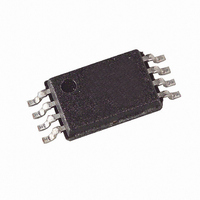T48C862M-R3-TNQ Atmel, T48C862M-R3-TNQ Datasheet - Page 59

T48C862M-R3-TNQ
Manufacturer Part Number
T48C862M-R3-TNQ
Description
IC MON TIRE PRESS 315MHZ 24SOIC
Manufacturer
Atmel
Datasheet
1.T48C862M-R3-TNS.pdf
(107 pages)
Specifications of T48C862M-R3-TNQ
Frequency
315MHz
Modulation Or Protocol
FM, FSK
Data Rate - Maximum
32 kBaud
Power - Output
10dBm
Current - Transmitting
9.5mA
Data Interface
PCB, Surface Mount
Antenna Connector
PCB, Surface Mount
Memory Size
1KB EEPROM, 1KB RAM
Voltage - Supply
2 V ~ 4 V
Operating Temperature
-40°C ~ 125°C
Package / Case
24-SOIC (0.200", 5.30mm Width)
Lead Free Status / RoHS Status
Contains lead / RoHS non-compliant
Features
-
Applications
-
Timer 3 – Mode 8:
FSK Modulation with Shift
Register Data (SO)
Timer 3 – Mode 9:
Pulse-width Modulation with
the Shift Register
Timer 3 – Mode 10:
Manchester
Demodulation/Pulse-width
Demodulation
4554A–4BMCU–02/03
The two compare registers are used for generating two different time intervals. The SSI
internal data output (SO) selects which compare register is used for the output fre-
quency generation. A "0" level at the SSI data output enables the compare register 1. A
"1" level enables compare register 2. The compare- and compare-mode registers must
be programmed to generate the two frequencies via the output toggle flip-flop. The SSI
can be supplied with the toggle signal of Timer 2. The Timer 3 counter is driven by an
internal or external clock source. The Timer 2 counter is driven by the Counter 3 (TOG3)
(see also combination mode 13).
Figure 57. FSK Modulation
The two compare registers are used for generating two different time intervals. The SSI
internal data output (SO) selects which compare register is used for the output pulse
generation. In this mode both compare- and compare-mode registers must be pro-
grammed for generating the two pulse widths. It is also useful to enable the single-action
mode for extreme duty cycles. Timer 2 is used as baudrate generator and for the trigger
restart of Timer 3. The SSI must be supplied with a toggle signal of Timer 2. The counter
is driven by an internal or external clock source (see combination mode 7).
Figure 58. Pulse-width Modulation
For Manchester demodulation, the edge detection stage must be programmed to detect
each edge at the input. These edges are evaluated by the demodulator stage. The timer
stage is used to generate the shift clock for the SSI. The compare register 1 match
event defines the correct moment for shifting the state from the input T3I as the decoded
bit into shift register - after that the demodulator waits for the next edge to synchronize
the timer by a reset for the next bit. The compare register 2 can also be used to detect a
time-out error and handle it with an interrupt routine (see also combination mode 8).
Counter 3
Counter 3
CM31
CM32
TOG2
CM31
CM32
T3O
SCO
T3R
T3R
T3O
SIR
SO
SO
0 0 0 0 0 0 0 0 0
0 1 2 3 4 0 1 2 3 4 0 1 2 3
0
0
0 0 0 0
0
0 0 0 0 0 1 2 3 4 5 6 7 8 9 1011121314150 1 2 3 4 5
4 0 1 2 0 1 2 0 1 2 0 1 2 0 1 2 0 1 2 0 1 2 0 1 2 3
1
1
T48C862-R3
6 7 8
0
9
10
1112
13
14
15
0
0
4 0
1
2 3
1
1
4
59













